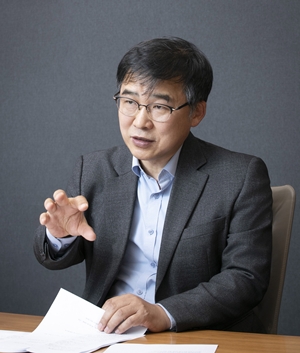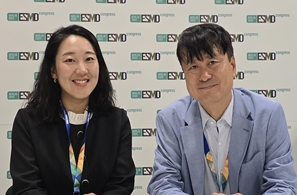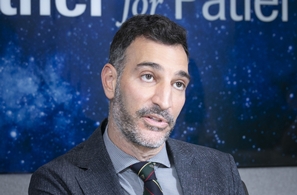- "COVID-19 differs from influenza…vaccination essential"
- by Whang, byung-woo | translator Hong, Ji Yeon | Apr 3, 2025 05:55am
After the announcement of the endemic in 2023, COVID-19 has repeatedly mutated, thus regarded as becoming a 'resident virus' that makes a comeback similar to influenza.
Although determining the exact seasonal pattern of COVID-19 may require more time, the government provides vaccination to high-risk groups, such as individuals aged 65 and older.

Currently, the legal status of COVID-19 has been designated as a class 4 infectious disease in South Korea after the endemic announcement in 2023. Like influenza, COVID-19 is categorized as an infectious disease requiring daily monitoring.
Despite the initial expectation that COVID-19 will show seasonal spikes, it has not demonstrated a clear seasonal pattern like influenza.
Dr. Kim explained, "COVID-19 is likely in a 'transition period.' The severity is lowered compared to the earlier phase of the pandemic due to vaccination, but it is yet to be defined as a seasonal virus," adding, "In the past few years, COVID-19 made a comeback in around January-February and around August. However, it is yet too soon to generalize."
"Over the past four years, the severity of COVID-19 has diminished compared to its early phase, thanks to immunity acquired through vaccination and natural infection. However, high-risk groups, including the elderly, individuals with underlying conditions, immunocompromised patients, pregnant women, and residents of long-term care facilities, continue to face a significant burden of disease, with a high risk of severe illness or death," Dr. Kim said.
Dr. Kim's attention to the COVID-19 vaccine during this transitional period is because COVID-19 exhibits infection characteristics distinct from those of influenza.
While both diseases may be perceived as similar, there are clear differences in infection patterns, causative pathogens, and complications. The influenza virus causes influenza, whereas COVID-19 is caused by SARS-CoV-2.
"The COVID-19 virus not only targets the respiratory system but also invades the vascular system, kidneys, and other organs, causing a systemic infection with higher severity and fatality rates," Dr. Kim stated. "Long COVID, affecting the entire body as a sequela, can occur, and its impact tends to be more severe in older individuals or those with weakened immune systems."
Although COVID-19 and influenza share similar symptoms and some complications, which can lead to them being conflated, experts warn that this may result in the risks of COVID-19 being underestimated, calling for heightened vigilance."
For these reasons, the government is currently administering COVID-19 vaccines to high-risk groups, including individuals aged 65 and older, immunocompromised persons aged at least 6 months, and residents of facilities vulnerable to infections, to prevent severe illness and death.
The ongoing issue is whether to include the COVID-19 vaccine in the National Immunization Program (NIP). There is a growing consensus that incorporating the COVID-19 vaccine into the NIP is essential to boost vaccination rates for the currently administered vaccines."
Dr. Kim said, "In addition to preventing infections, hospitalizations, and deaths at the individual level, incorporating the COVID-19 vaccine into the NIP is essential for sustaining our national population. For instance, by systematically benchmarking the well-established NIP for the influenza vaccine in individuals 65 and older, we can effectively plan and implement a similar strategy for the COVID-19 vaccine."
There is ongoing concern about determining the optimal vaccination schedule, as it remains difficult to predict the precise timing of the COVID-19 surge.
Dr. Kim emphasized, "When establishing the vaccination schedule for the COVID-19 vaccine, it is crucial to base decisions on scientific evidence regarding the outbreak period, the duration of antibody persistence, and the vaccine's ability to counter emerging variants." He advised, "Antibodies may not form adequately or may quickly be depleted in individuals with severe immunocompromise. It is advisable to tailor the dosing frequency and timing based on each patient's immune status."
Dr. Kim added, "High-risk groups such as immunocompromised individuals and residents of long-term care facilities face a significantly higher risk of severe illness if infected, yet their vaccination rates remain low. If we were to improve COVID-19 vaccination rates, government's promotional activities is essential."
"COVID-10 vaccination can be compared to wearing a seat belt, lowering severity"
Currently, two mRNA COVID-19 vaccines are available in Korea. Aside from a minor difference in antigen dosage (approximately 30 to 50 micrograms) their basic compositions, including encapsulation in lipid nanoparticles, are virtually identical.
In clinical practice, healthcare providers typically use whichever vaccine is distributed to their institutions and available for immediate use.
However, due to differences in domestically imported volumes, over 80% of vaccinations administered during 2023–2024 were Pfizer's Comirnaty.
In global Phase 3 trials, Comirnaty demonstrated a 95% preventive efficacy across COVID-19–naïve and previously infected participants, with overall safety profiles remaining favorable.
Dr. Kim explained, "mRNA vaccines like Comirnaty induce a robust T-cell immune response, ensuring that the benefits of preventing severe disease and death are sustained over a long period. The Korea Disease Control and Prevention Agency also strongly emphasizes these outcomes when recommending COVID-19 vaccination."
One of the concerns raised about COVID-19 vaccines has been safety issues that emerged during the pandemic. However, Dr. Kim believes that confidence in the vaccine's safety has increased.
He noted, "Among high-risk groups such as those aged 65 and older or individuals with underlying conditions, no significant adverse reactions have been observed, and the benefits of vaccination are substantially greater," adding, "With sufficient vaccination experience now accumulated and those who experienced adverse reactions subsequently excluded from further dosing, the incidence of adverse events in recent vaccination cohorts is very low."
He particularly compared vaccination to wearing a 'seat belt.' Although wearing a seat belt can be uncomfortable and does not guarantee 100% prevention of injuries, it significantly reduces the risk when an accident occurs. Similarly, COVID-19 vaccination is essential to lower the risks of infection and severe disease.
Lastly, Dr. Kim stressed that a coordinated effort at the individual, societal, and government levels remains critical for effective COVID-19 management.
Dr. Kim said, "High-risk groups, such as the elderly and those with underlying conditions, must recognize their risk of infection and proactively get vaccinated, and if they experience symptoms, they should promptly seek diagnosis and treatment," adding, "I believe including the COVID-19 vaccine in the NIP can be expedited if individuals actively voice their concerns."
"On a societal level, we need to foster a 'take a break when you're sick' culture, and at the government level, it is essential to establish an independent monitoring system solely for COVID-19," Dr. Kim added. "The government must quickly set vaccination schedules and develop promotional strategies based on up-to-date data on the latest COVID-19 outbreak patterns, disease burden, and the efficacy and safety of vaccines."
-

- 0
댓글 운영방식은
댓글은 실명게재와 익명게재 방식이 있으며, 실명은 이름과 아이디가 노출됩니다. 익명은 필명으로 등록 가능하며, 대댓글은 익명으로 등록 가능합니다.
댓글 노출방식은
댓글 명예자문위원(팜-코니언-필기모양 아이콘)으로 위촉된 데일리팜 회원의 댓글은 ‘게시판형 보기’와 ’펼쳐보기형’ 리스트에서 항상 최상단에 노출됩니다. 새로운 댓글을 올리는 일반회원은 ‘게시판형’과 ‘펼쳐보기형’ 모두 팜코니언 회원이 쓴 댓글의 하단에 실시간 노출됩니다.
댓글의 삭제 기준은
다음의 경우 사전 통보없이 삭제하고 아이디 이용정지 또는 영구 가입제한이 될 수도 있습니다.
-
저작권·인격권 등 타인의 권리를 침해하는 경우
상용 프로그램의 등록과 게재, 배포를 안내하는 게시물
타인 또는 제3자의 저작권 및 기타 권리를 침해한 내용을 담은 게시물
-
근거 없는 비방·명예를 훼손하는 게시물
특정 이용자 및 개인에 대한 인신 공격적인 내용의 글 및 직접적인 욕설이 사용된 경우
특정 지역 및 종교간의 감정대립을 조장하는 내용
사실 확인이 안된 소문을 유포 시키는 경우
욕설과 비어, 속어를 담은 내용
정당법 및 공직선거법, 관계 법령에 저촉되는 경우(선관위 요청 시 즉시 삭제)
특정 지역이나 단체를 비하하는 경우
특정인의 명예를 훼손하여 해당인이 삭제를 요청하는 경우
특정인의 개인정보(주민등록번호, 전화, 상세주소 등)를 무단으로 게시하는 경우
타인의 ID 혹은 닉네임을 도용하는 경우
-
게시판 특성상 제한되는 내용
서비스 주제와 맞지 않는 내용의 글을 게재한 경우
동일 내용의 연속 게재 및 여러 기사에 중복 게재한 경우
부분적으로 변경하여 반복 게재하는 경우도 포함
제목과 관련 없는 내용의 게시물, 제목과 본문이 무관한 경우
돈벌기 및 직·간접 상업적 목적의 내용이 포함된 게시물
게시물 읽기 유도 등을 위해 내용과 무관한 제목을 사용한 경우
-
수사기관 등의 공식적인 요청이 있는 경우
-
기타사항
각 서비스의 필요성에 따라 미리 공지한 경우
기타 법률에 저촉되는 정보 게재를 목적으로 할 경우
기타 원만한 운영을 위해 운영자가 필요하다고 판단되는 내용
-
사실 관계 확인 후 삭제
저작권자로부터 허락받지 않은 내용을 무단 게재, 복제, 배포하는 경우
타인의 초상권을 침해하거나 개인정보를 유출하는 경우
당사에 제공한 이용자의 정보가 허위인 경우 (타인의 ID, 비밀번호 도용 등)
※이상의 내용중 일부 사항에 적용될 경우 이용약관 및 관련 법률에 의해 제재를 받으실 수도 있으며, 민·형사상 처벌을 받을 수도 있습니다.
※위에 명시되지 않은 내용이더라도 불법적인 내용으로 판단되거나 데일리팜 서비스에 바람직하지 않다고 판단되는 경우는 선 조치 이후 본 관리 기준을 수정 공시하겠습니다.
※기타 문의 사항은 데일리팜 운영자에게 연락주십시오. 메일 주소는 dailypharm@dailypharm.com입니다.









